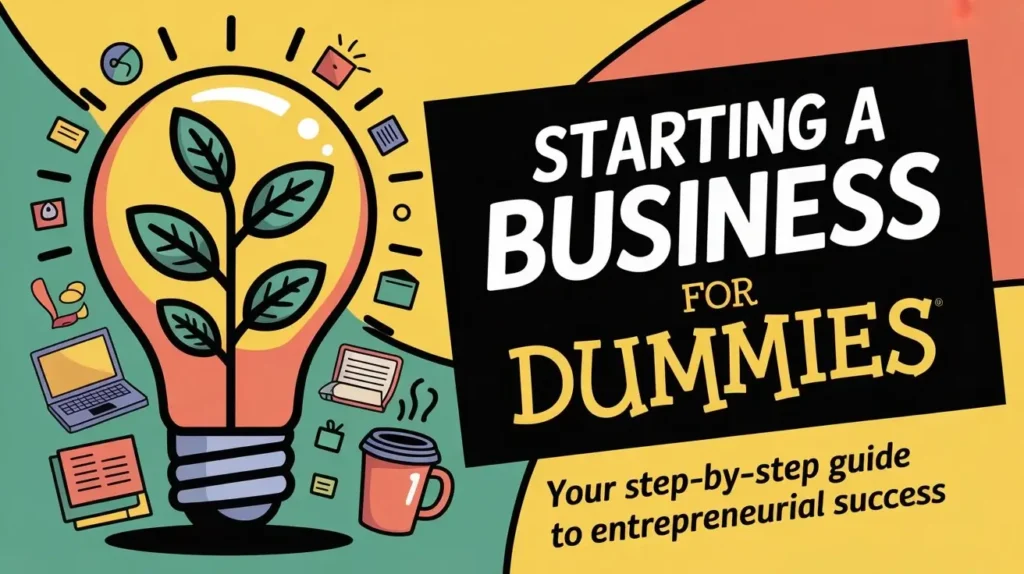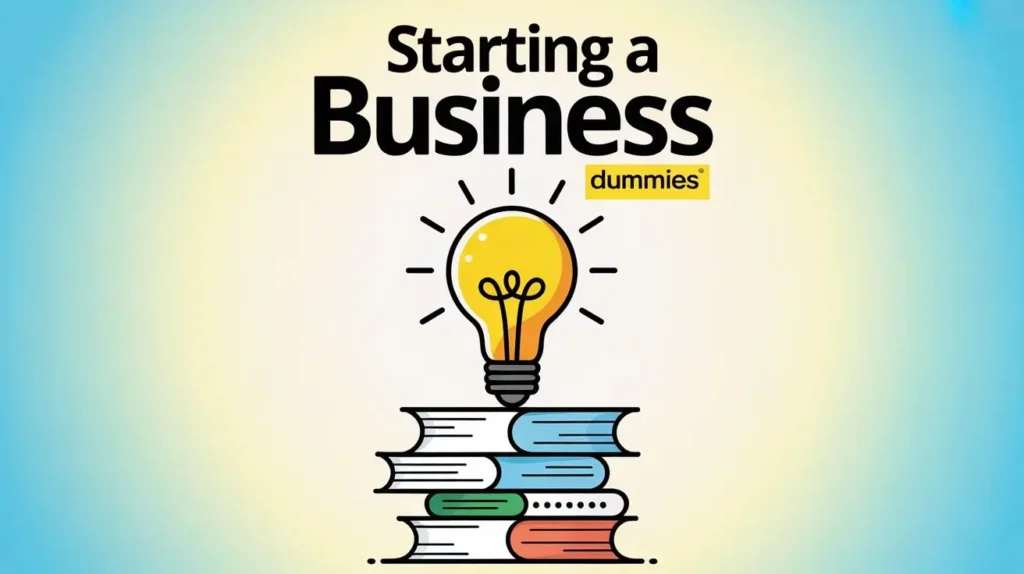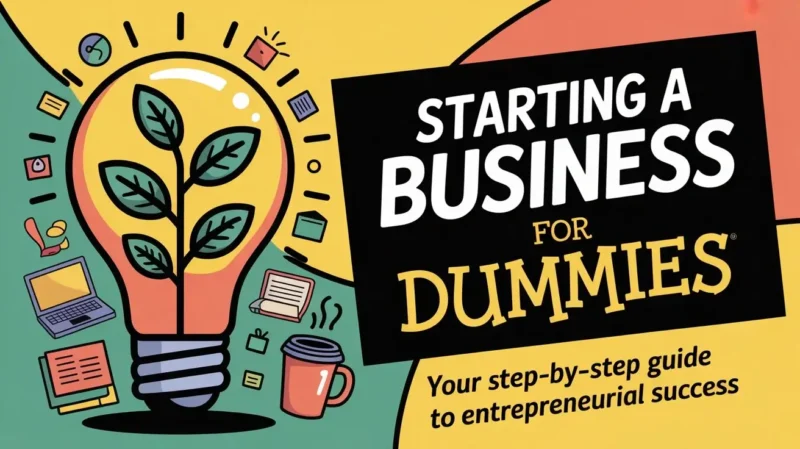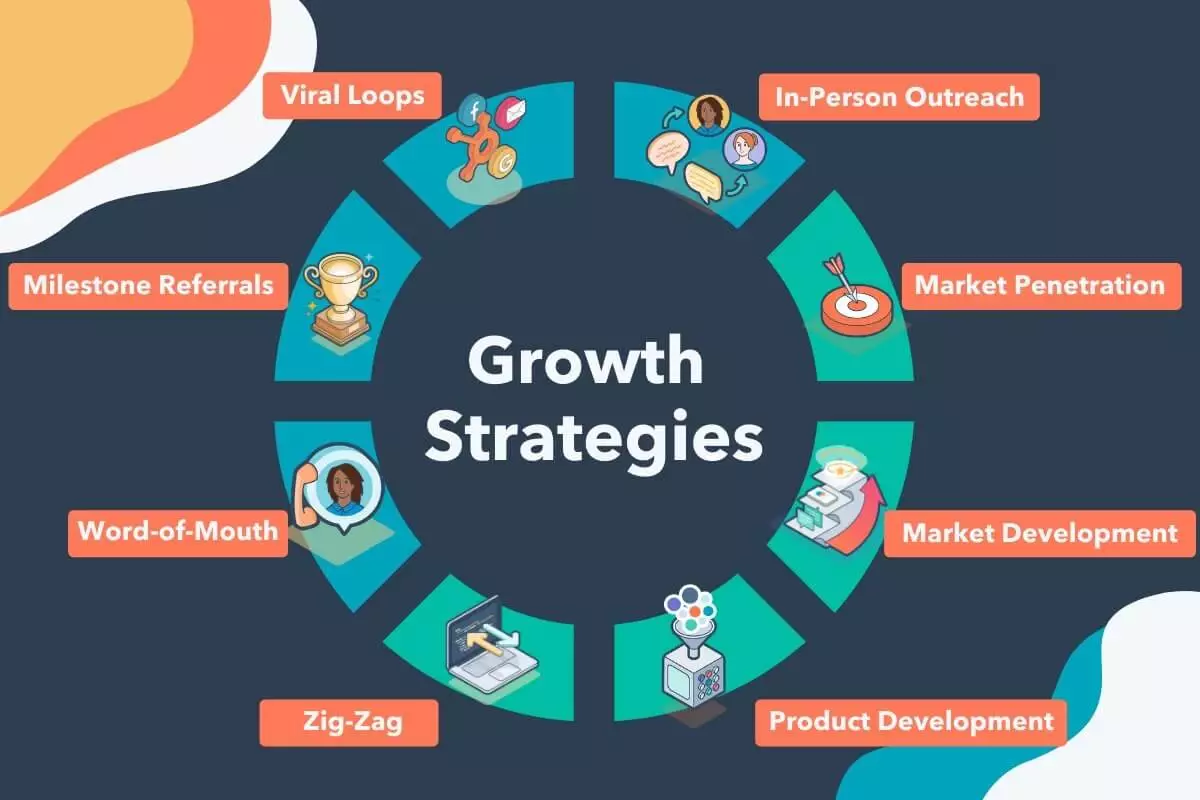Starting a business can feel like jumping into deep water without knowing how to swim. You have a great idea, but where do you begin? That’s where starting a business for dummies comes in a simple, step-by-step approach for anyone who wants to transform an idea into a successful venture without feeling overwhelmed.
As someone who has helped dozens of first-time entrepreneurs build their dream companies, I can tell you that launching a business doesn’t require an MBA, just clear guidance, persistence, and a good roadmap. Let’s explore exactly how this beginner-friendly approach works and what you need to know to get started.

Content
Why “Starting a Business for Dummies” Works for Beginners
If you’ve ever read a “For Dummies” guide, you know its magic lies in simplicity. Starting a business for dummies is built on the same idea breaking down complex business concepts into easy, actionable steps.
For beginners, this approach works because it focuses on what matters most in the early stages: understanding your idea, validating it, and building from the ground up. You don’t need to know everything about accounting, marketing, or law right away, you just need to know where to start.
Develop a Realistic Business Idea
Every great business starts with a spark, a problem that needs solving. If you’re exploring how to start a small business for beginners, the key is to find an idea that meets a real need.
Here’s what I always tell new founders: passion is fuel, but purpose is direction. You might love baking, but if your town already has ten bakeries, what makes yours different? Maybe it’s gluten-free treats or sustainable packaging.
Quick checklist to validate your business idea:
- Identify the problem your product solves
- Study your competitors and gaps in the market
- Ask real people for feedback
- Estimate basic costs and profit potential
If the numbers make sense and people genuinely want what you offer, you’re off to a great start.
Craft a Simple but Effective Business Plan
Most beginners think a business plan has to be a 30-page document full of graphs and financial projections. In reality, you just need clarity.
A beginner’s guide to entrepreneurship usually includes a lean business plan one that outlines what you sell, who it’s for, and how you’ll make money. Think of it as your blueprint, not a rigid manual.
How to create a business plan for beginners:
- Write down your business name and mission
- Define your target audience
- List your products or services
- Estimate your expenses and pricing
- Outline how you’ll reach customers
This step in starting a business for dummies ensures you stay focused and avoid distractions that waste time and money.
Choose the Right Business Structure

Your business structure determines your legal responsibilities, taxes, and how profits are handled. It’s one of the most important choices when starting a business for dummies step by step.
Here are the most common structures:
- Sole Proprietorship: Easy to start but full personal liability
- Partnership: Great for two or more co-founders sharing ownership
- Limited Liability Company (LLC): Offers flexibility and protection
- Corporation: Ideal for larger ventures seeking investors
If you’re unsure, an LLC is often the simplest and safest route for beginners.
Handle the Legal and Registration Side
Once you’ve chosen your structure, you’ll need to make it official. Register your business name, obtain necessary permits, and check tax obligations in your region.
It might sound intimidating, but this part of starting a business for dummies is mostly about paperwork, something you can complete online with guidance from your local business authority.
Many new entrepreneurs forget to open a separate business bank account. Keeping your personal and business finances separate is crucial for clarity and future growth.
Secure Funding (Even If You Have Little Money)
Not everyone starts with a pile of cash and that’s okay. The easiest way to start a business with little money is by using smart, resourceful methods.
Some practical options include:
- Bootstrapping: Using personal savings or side income
- Small business loans: Offered by banks or microfinance programs
- Crowdfunding: Platforms like Kickstarter or GoFundMe
- Grants or incubators: Perfect for startups with social or tech innovation
When starting a business for dummies, remember: the goal isn’t just getting money it’s managing it wisely. Always budget for essentials first: operations, marketing, and product development.
Build Your Brand and Online Presence
Even the best product won’t succeed if no one knows it exists. In today’s digital world, your online presence is your storefront and one of the most effective Business Growth Strategies you can invest in.
As part of your business startup checklist, make sure to include these essential branding steps:
- Design a simple logo that reflects your mission and values
- Create a professional website even a single-page site works at first
- Open social media accounts where your target audience is most active
- Share valuable content and updates consistently to build engagement
Your goal is to build trust before you even make your first sale. Remember, people don’t just buy products they buy stories, experiences, and brands that align with their beliefs. Strong branding backed by smart Business Growth Strategies turns curious visitors into loyal customers.
Real-Life Case Study: Sarah’s Green Bite Organics
Sarah, a college graduate with a passion for healthy living, decided to start a small organic food business. She followed the starting a business for dummies approach, beginning with a simple idea of locally made organic snacks.
Here’s how she did it:
- Idea Validation: She sold test batches at local markets and collected feedback.
- Business Plan: Used a one-page plan to track goals and pricing.
- Funding: Started with $2,000 of savings (bootstrapping).
- Branding: Built a social media page with behind-the-scenes stories.
Within six months, GreenBite Organics became a local favorite and started supplying cafés. Sarah’s success shows that even common mistakes when starting a business for beginners like overspending or overplanning can be avoided with the right roadmap and mindset.
Stay Flexible and Learn From Mistakes

No matter how prepared you are, challenges will come. Maybe your marketing flops, or sales don’t meet expectations at first. That’s part of entrepreneurship.
The business basics for new entrepreneurs include adaptability being open to feedback, learning from data, and pivoting when needed. Many first-time founders give up too early because they expect instant success. In reality, progress is gradual.
The key is consistency. Keep refining your plan, building relationships, and staying curious.
Conclusion:
At its heart, starting a business for dummies isn’t just about learning steps it’s about building the confidence to take action. With the right mindset and guidance from resources or even a Business Strategy Consultant, anyone can turn an idea into a thriving business.
From crafting a powerful concept to creating a lean plan, managing finances wisely, and building a recognizable brand, the entrepreneurial journey is filled with learning, growth, and reward.
Remember Sarah’s story she didn’t have money or experience, just determination, structure, and a clear strategy. You can do the same.
So, grab a notebook, map out your business startup checklist, and take that first step toward becoming your own boss. Every successful entrepreneur even the best Business Strategy Consultant today once started exactly where you are now, asking, “How do I start?”
“Starting a Business for Dummies” offers practical guidance for new entrepreneurs, simplifying complex steps and strategies. Whether planning or growing a venture, it’s a valuable resource for insights, tips, and opportunities to advertise with us effectively.
FAQs about Starting a Business for Dummies:
What does “Starting a Business for Dummies” mean?
“Starting a Business for Dummies” refers to an easy-to-follow approach that breaks complex business startup steps into simple, practical actions for beginners.
How do I start a small business for beginners?
Begin by finding a profitable idea, validating it through market research, creating a simple business plan, and choosing the right business structure before launching.
What is the easiest way to start a business with little money?
Start small by offering services or products you can produce at home, use free digital marketing tools, and reinvest early profits to grow over time.
How to create a business plan for beginners?
A beginner-friendly business plan should include your business goals, target market, pricing strategy, and estimated costs. Keep it short but actionable.

Andrew is a highly creative and dedicated person with an entrepreneurial spirit. He is always looking for ways to help people, whether it be contributing to their success or just making them laugh. His commitment is demonstrated through the dedication he has put into all of his work so far, which includes writing business blogs for various companies as well as running his own blog on Medium. He loves reading books about how other people became successful entrepreneurs like himself; he finds inspiration from these stories and hopes to make a positive impact on others’ lives too!











